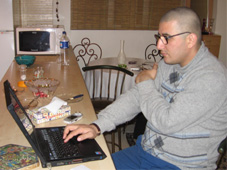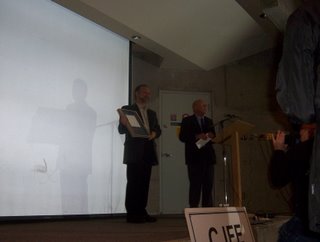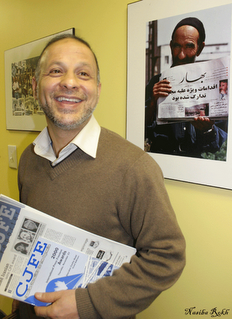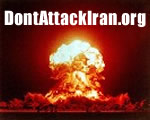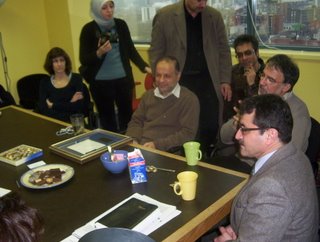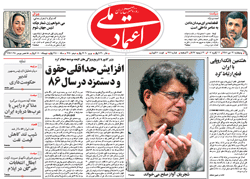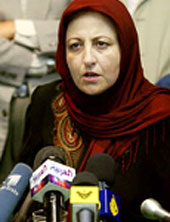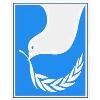
An Iranian cleric journalist works at the offices the reformist daily Etemad-Malli's offices in Tehran. The offices of the newspaper were attacked overnight and its entrance blown up, according to the paper's public relations officer. Launched in Feb. 2006, Etemad-Melli is published by Mehdi Karrubi, a reformist cleric and a presidential hopeful of the June 2005 election. (Photo: Atta Kenare / AFP-Getty Images).
Information Crackdown
Niusha Boghrati
Worldpress.org correspondent
October 26, 2006
It was less than a decade ago that for the first time in years, Iranians began to feel the intoxicating breeze of long-denied basic civil rights — foremost among them, the right to express themselves and the right to know.
In the summer of 1997, more than 20 million Iranians — the majority of them long-oppressed youth and women — wrote on their ballots the one name that they felt could make their wildest dreams come true in bringing back "freedom" to their lives, Mohammad Khatami.
With his ascension to the presidency, the reformist Khatami began to fulfill many of his vows: the massive social suppression on the youth began to fade away; the banned books got published; banned movies were screened and theaters were filled; concerts and other cultural gatherings such as festivals were held; and perhaps most significantly of all, the concept of a "free press" was revived.
Tens of different newspapers and journals emerged, produced by long-suppressed journalists and elites. Major policies were criticized, debates were held, and most surprising to Iranians the president remained supportive.
Following the basic changes that were taking place in the political, social, and cultural arenas in Iran, the critics then took the opportunity to focus on what they saw as the fundamental factor behind the Islamic Republic's anti-democratic charter — absolute dominance of a supreme leader, Ayatollah Ali Khamenei.
The red line had been crossed.
More than 100 pro-reformist publications were shut down by the direct order of Khamenei, journalists were put in prison, the student movement was brutally cracked down upon, and activists were suppressed, even murdered. Khatami himself paid a price in the challenge over the freedom of expression — his major reform adviser, Saeed Hajjarian, was assassinated, his culture minister was forced to resign, and his minister of internal affairs was jailed.
The major fight over the reforms had begun.
During the two terms of Khatami's presidency, although the suppression of the press resulted in the closure of hundreds of papers, still the spirit of the movement was kept alive by substitute journals that kept emerging after others had been shut down.
But the eight years passed quickly. Khatami and his reformist allies were put away and a new face filled the president's office in Tehran — Mahmoud Ahmadinejad. With ascension of Ahmadinejad, which unlike Khatami's victory was warmly greeted by the supreme leader and other "behind the scenes" figures, many worried that the then relatively free cultural environment of Iran would revert back into its dark times.
Their worries came true.
At the beginning it seemed like the routine crackdown on journalists that Iranians had become accustomed to, but then the fundamental curbs on free speech revealed that it had much more to it. Ahmadinejad's hard-line government which now was granted the full support of the leadership began a systematic crackdown, not only on the press, but also on every other existent avenue of information — books, satellite television, and most significantly, the Internet.
This time it was not only about dissidents who opposed the system; it was what one might call, "a major battle with the free flow of information."
The Internet
The first and most telling example of the crackdown on information can be found in the overt intolerance shown toward Internet-related activities, and the heavy, unusual methods used to confine users.
In the latest unexpected policy action, Iran's Internet service providers (ISPs) have started reducing the speed of Internet access to homes and cafes based on new government-imposed limits — a move critics said appeared to be part of the clampdown on the media. An official said last week that ISPs were now "forbidden" by the Telecommunications Ministry from providing Internet connections faster than 128 kilobytes per second (kbps), as reported by the official IRNA news agency. The official did not give a reason.
Internet technicians say speeds of 256 kbps, 512 kbps, or higher are increasingly common internationally. Iranian surfers will now find the Web much slower, especially to download audio and video files.
This new decision is apparently much wider in scope than the previous policy of suppression and intimidation. It can also be considered among the first times that the Iranian government has overtly denied its people from accessing "technology" in favor of censorship.
An Iranian Internet engineer, who asked not to be identified, said his firm had started reducing speeds provided to homes and Internet cafes, but not businesses. The Telecommunications Ministry official said the order would stay in place until "new regulations for providing ADSL (high-speed Internet) services" were issued, IRNA reported.
It was not clear if this meant the restrictions were only temporary, but another ISP official said he expected them to stay in place. He said his firm had yet to be officially informed of the new order but was starting to impose the limitations on customers anyway, "because we are not looking for trouble."
Filtering and site-blocking had so far been the most advanced method of 'net limitation in Iran, with more than 10 million Web sites being currently filtered. Discussing the policy on Sept. 11, Ismail Radkani, the director-general for Management and Technical Support at the state Information Technology Company, noted that the filtering software database is updated automatically on a daily basis.
Ramazanali Sadeqzadeh, a legislator from the northern city of Rasht, explained that a small committee in the Supreme Cultural Revolution Council monitors the filtering of Web sites. The committee consists of personnel from the Intelligence and Security Ministry, the Islamic Culture and Guidance Ministry, and Islamic Republic of Iran Broadcasting. Its decision to filter a site is relayed to the Communication and Information Technology Ministry.
It should be noted that Ahmadinejad's fundamentalist administration did not initiate efforts to filter the Internet. The policy, in fact, got underway during the Khatami presidency. At that time, however, control of Internet activities was initially connected with the state's effort to reverse losses in telecommunication revenues, and only later was it related to control of information and expression.
It was not until May 2006 and the Ahmadinejad presidency that the Communication and Information Technology Ministry announced the creation of a central filtering site. According to initial reports, this facility would block access to unauthorized Web sites, identify Internet users, and keep a record of the sites they visited. The system administrator would have access to all the noted information.
The ministry subsequently denied that the filtering facility could identify users and track their browsing habits, and it stressed that it only wants to block access to pornography.
Technology Minister Soleimani announced on April 19 that a "national Internet will be established this year," state television reported. The characteristics of the so-called "national Internet" has not yet been specified, but the main objective of the promised program will be a drastic cut-off from the global media.
Although the new technological crackdown on the Internet seems to be the preferable method of the Islamic Republic of Iran to suppress the digital flow of information, related arrests and interrogations still continue.
In the past six months at least five bloggers and Web site managers have been prosecuted in Iran. Furthermore, on Oct. 21 the state-run IRNA news agency reported that the deputy prosecutor of Tehran had announced the establishment of a special court for Internet "crimes."
Foreign-based Persian and English news Web sites are the most used sources of information by the majority of Iran's young population. According to Iranian officials, the country has more than 11 million Internet users, and Persian is among the most blogged languages on the World Wide Web.
The Press
The press, as the most traditional target of suppression against the flow of information in Iran, has had the most casualties in the new crackdown. During the spring and summer of 2006 more than 29 cases of prosecutions against journalists, 35 cases involving editors, and 8 cases of confiscation of press materials have been filed.
The most recent such press-ban order was issued for the Roozegar newspaper, which many believed was going to replace the newly-closed pro-reform Shargh daily.
Roozegar was banned after only six days of publication on the charges that its logo resembled Shargh, and that according to its license it was not allowed to specifically contain political materials. Such an allegation directly contravenes the official press law of the Islamic Republic of Iran which states, "Any journal of non-political license is allowed to specify up to 20 percent of its space to political issues and its crossover with other journalistic fields."
However, many believe that current issue is just an excuse to remove the reformist press from the news arena.
"This is not the true reason for Roozegar's confiscation. At present there are other dailies that are not licensed for political analysis and yet continue to be somewhat purely political; newspapers such as Hamshahri and Jaam-e Jam [two of the state-run dailies]," said the spokesman of Iran's Press Rights Defenders, Mashaollah Shamsolvaezin. "The fact is that they do not want independent reformist papers such as Roozegar which had hired Shargh's staff to exist."
Shargh was an intensively-read newspaper among the Iranian elite and students. It was considered the very last of the pro-Khatami journals that had still managed to maintain its presence during the first year of Ahmadinejad's presidency. The paper's closure, which coincided with the shutting down of three other independent magazines — Nameh, Hafiz, and Khatereh — provoked a wave of condemnation by moderate politicians, as well as the elite and regular readers.
Some of the charges that led to Shragh's closure were as follows:
Publishing a report mentioning pre-marriage sexual relations.
Reflecting "interfering opinions" of a foreign ambassador in Tehran within an interview accompanied by an "affirmative" picture of his.
Naming the BBC as an authentic news source and interviewing one of its journalists.
Circulating Marxist beliefs.
Sarcasm directed at the Islamic revolution.
Publication of an ambiguous caricature. (The caricature showed a chess table with a donkey, instead of horse, that had a circle of light above its head. Allegations indicated that it resembled Mahmoud Ahmadinjad when he had said he was covered in a glow at the United Nation's General Assembly.)
Although Iranian journalists had always faced a certain amount of censorship in their work, the new accusations revealed a new level of intolerance toward the press. In another case Iran Daily, a government-run newspaper, was closed down after the publication of a caricature that was considered insulting to the Turkish minority in Iran. Its caricaturist, Mana Neyestani, and the editor, Mehrdad Ghasemfar, were detained for months and after substituting the some 300 pro-reform staff of the newspaper, Iran Daily began its publication with a new format and policy.
The Nameh monthly was also shut down for publication of a poem which was accused of being insulting to the leader of the Islamic Revolution, Ayatollah Khomeini. The renowned poet, 70-year old Simin Behbahani, was previously beaten up by the police while attending a protest against women's rights violations in Iran.
Previously, many news topics were semi-officially frowned upon (and according to internal announcements, prohibited) for journalists to explore; areas such as "any analysis on Iran's nuclear program." But now with the new accusations many Iranian journalists wonder where their new redlines are, and fear of probable prosecution has led into an atmosphere of self-censorship which has profoundly paralyzed journalistic activities.
The anti-media policy has contagiously moved from the print media to the news-providers as well. Right after his ascension, President Ahmadinejad's culture minister Hossein Saffar Harandi ordered the formation of a new Board of News Wires Observers to keep an eye on the activities of the major news-providers. Following the formation of the board, ISNA news agency was charged with many accusations and reportedly 40 to 50 percent of ILNA's reformist reporters were expelled due to "financial reasons," as announced.
The Association for Freedom of the Press in Iran says that current conditions mark the darkest period in a century for the profession. In a statement, the Association voiced widespread concerns about increased pressure and restrictions being put on journalists and the independent media. The statement demanded that those who openly break the law be brought to justice, and added that, in recent months, the Association had received disturbing reports about violations of the constitution and press laws by the Ministry of Culture and Islamic Guidance, the Supreme National Security Council, and prosecutors in Tehran and the provinces.
Satellite
For a country that according to the law all broadcasts are state-run, and the guidelines for the programs are directly determined by the representative of Supreme leader, satellite T.V. channels presented an attractive alternative that soon drew the attention of millions of Iranians in the early 1990s.
In 1995 the Iranian Parliament passed a law outlawing satellite dishes in a bid to rid the country of "western influences" and prevent foreign-based opposition groups from broadcasting into the country. However, the ban was not strictly enforced.
During mid-summer, Iranian police launched a crackdown against "decadent" satellite television in the Islamic Republic, raiding rooftops in Tehran and other major cities to seize thousands of illegal dishes.
The action followed a warning issued recently by Tehran's then-metropolitan police chief under Khatami, up until his successor took the office last year, to the country's estimated three to four million satellite television watchers who dared to defy the law.
"The use of satellite dishes is prohibited by law and we ask people not to use this equipment anymore," Morteze Talaie said.
Police armed with warrants raided rooftops of large apartment blocks and high-rises in the chic northern and western areas of Tehran on Sunday and have conducted similar operations in other cities, witnesses and press reports said. The police reportedly did not enter apartments themselves, instead seizing dishes installed on roofs of large buildings.
The head of Tehran's provincial police, Reza Zarei, was quoted in the press as saying that the police force will act "against people who conspicuously install their dishes."
Programs broadcast on satellite channels are considered "decadent" by the authorities in the Islamic Republic, which frequently tries to jam the airwaves. Hacked decoders make it possible to receive several hundred satellite channels, including more than two dozen financed by the exiled Iranian opposition, mainly based in the United States.
Many Iranians also use the satellite channels to listen to foreign-based Persian news broadcasts such as the BBC, VOA, and Radio Farda, an American-funded station that covers the human rights violations and political issues intensively.
Books
According to many Iranian writers and publishers, during the past year the publication of many previously authorized books has been held up. There are also reports that many of the books that had obtained a publication license were not granted a distribution permission and therefore have not reached the book shelves.
The culture minister of Ahmadinejad's cabinet, Hossein Saffar Harandi, and the secretary of interior affairs, Mostafa poor Mohammadi, have repeatedly stated their opposition to the cultural programs of Khatami's government calling them anti-Islamic.
"None of the cultural products [books, films, music, etc.] that you see right now are not driven from or approved by this new government," said Saffar Harandi. "The cultural products which are not based on the Koran's studies are not acceptable and we do not need them. Our cultural programs are yet to get started."
During the last Annual Book Fair in Tehran, many of the previously licensed books were seized from the shelves.
Many of Ahmadinejad's key ministers such as Interior Minister Mostafa Poor Mohammadi, Intelligence Minister Gholam Hossein Mohseni Ezhei, and Minister of Culture Hossein Saffar Harandi, are strongly accused by human rights watchdogs for their alleged role in the clampdown on dissidents in past years. Some are even charged with performing key roles in the mass execution of political prisoners during 1988, and the intellectuals chain murders of 1998.
Poor Mohammadi, then deputy intelligence minister, was expelled from duty after Khatami's victory in the election for the role he played in the aforementioned murders.
According to the Paris-based media watchdog Reporters Without Borders, Iran is the biggest jail for journalists in the Middle East. It ranks among the top ten press rights violator states of the world, and its leaders, Ayatollah Ali Khamenei and president Mahmoud Ahmadinejad, are among the enemies of the free flow of information.
The government denies these charges, saying it welcomes criticism.
View the Worldpress Desk’s profile for Niusha Boghrati.
Related Articles
Election Backlash Against AhmadinejadOmid Memarian, Worldpress.org correspondent, December 26, 2006
The Concept of FreedomNiusha Boghrati, Worldpress.org correspondent, December 7, 2006
Information Technology and Development in Africa: The Case of EritreaRavinder Rena, Asmara, Eritrea, November 26, 2006
Police Beat Protesting WorkersNiusha Boghrati, Worldpress.org correspondent, October 3, 2006
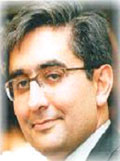
 |
|

